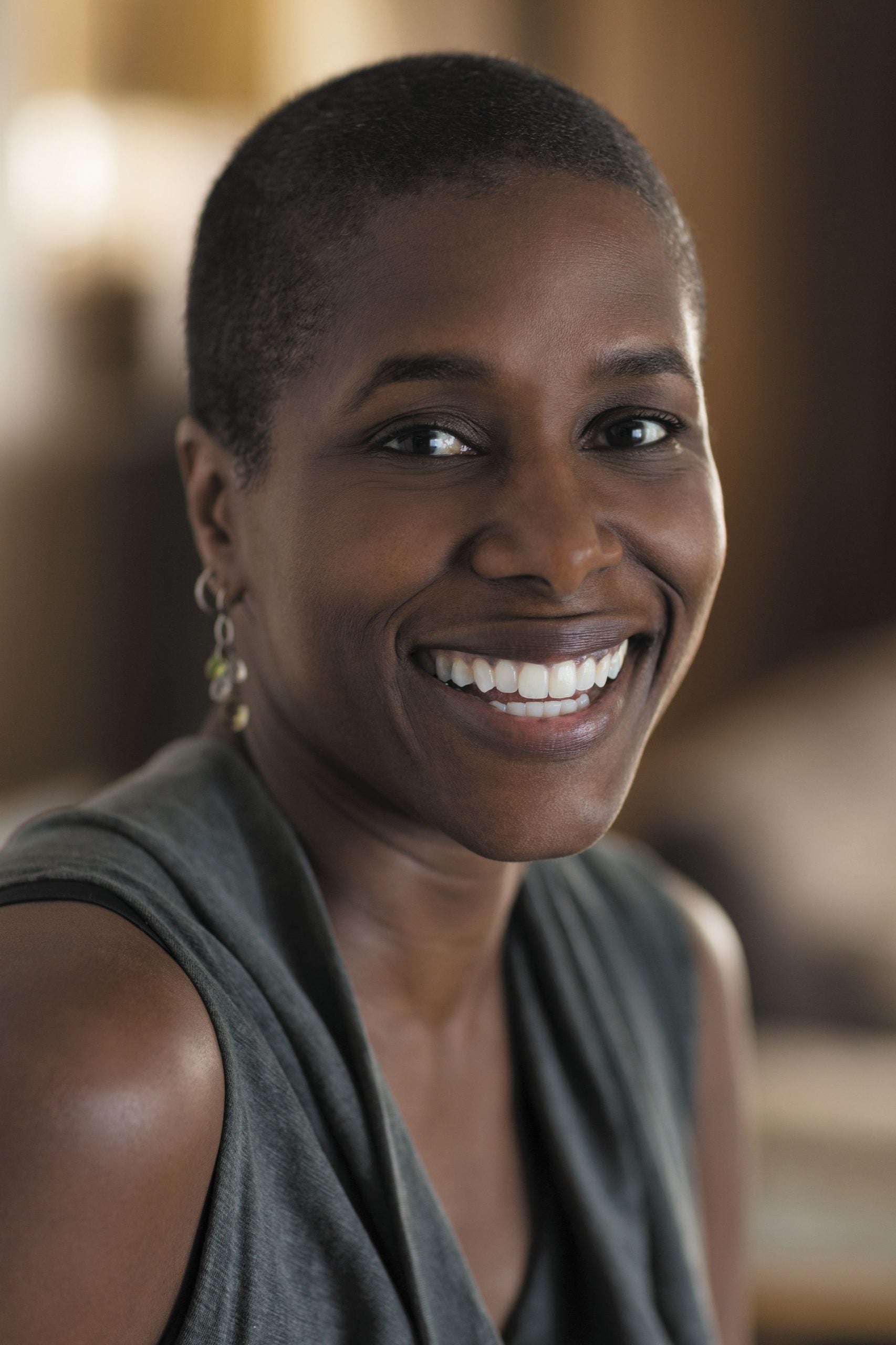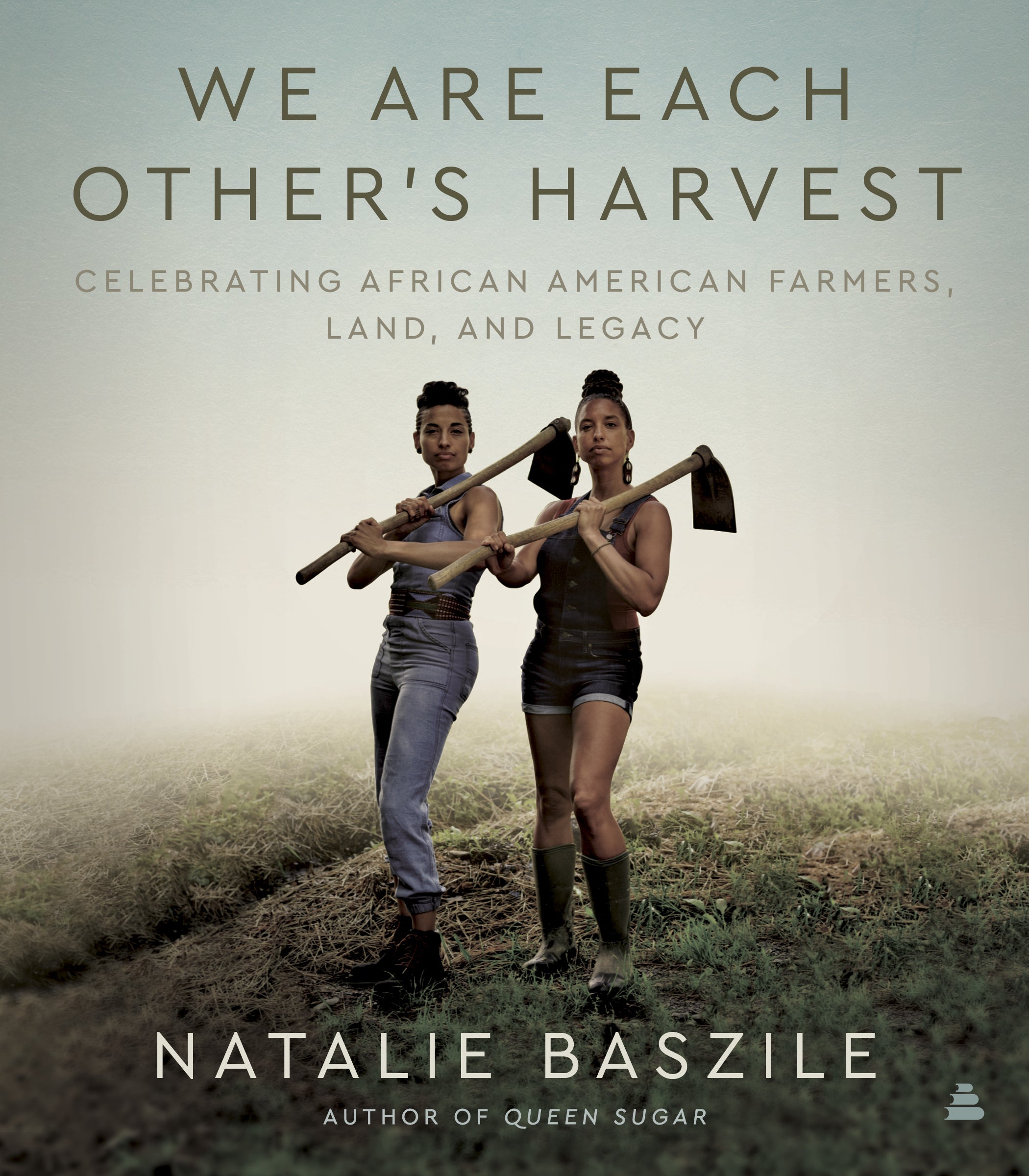 By Niema Jordan ·April 6, 2021April 5, 2021
By Niema Jordan ·April 6, 2021April 5, 2021
When Natalie Baszile’s publisher reached out to her about writing a companion book to the OWN series Queen Sugar, based on her 2014 novel by the same name, she decided against a behind-the-scenes look at the show. Instead, knowing that the number of Black farmers had dwindled from approximately one million to a mere 45,000 in the last 100 years, Baszile decided to tackle the connection between Black people and land by speaking with the very people who work it.
In her latest book,We Are Each Other’s Harvest, Baszile shares the stories of Black farmers throughout the United States. Through essays, interviews, poems and more, Baszile gives us a look into the struggles, resilience, and legacy of Black farmers. We spoke with Baszile about her new book, the importance of land, and her hopes for the future of Black farming.
What was one of your biggest takeaways from writing We Are Each Other’s Harvest?
BASZILE: I continue to really marvel at and be inspired by Black farmer’s resilience. Yes. They have endured generations of struggle and hardship, no question about that, but their perseverance, their creativity, their determination to keep doing this thing that they love, and that is part of our larger history as black people, continues to really astound me. I think what I take away from that is really just a reminder about the beauty of black people. Our determination to triumph, really, in the face of unspeakable odds, I continue to draw strength from that. Everytime I get discouraged, I reflect on everything that Black farmers have been through since emancipation, before that, and that is a source of strength for me.
 Natalie Baszile
Natalie Baszile
What inspired you to write this book?
BASZILE: I think that part of the reason why I wanted to write this book was also to remind Black people who have moved away from the land and who might see that old historic connection as something negative. I’m trying to say this is a source of empowerment. I think a lot of times Black people view anything connected with manual labor, physical labor as not moving forward, not progressing. And I’m trying to say, this is actually a form of progress and a form of advancement.
How is farming connected to progress for Black people?
BASZILE: We have to think about this really in two ways. We have to think about this literally, the literal connection to the land, and all of the positive effects that come out of being connected to the soil. You have everything, from the benefits to your health and wellbeing of being out in the open air, out in nature. What that does for your spirit, what that does for your body. There are all of the health benefits of having access to fresh food, having access to food you grow. There are all kinds of literal health benefits to knowing where your food comes from.
But then there are also the metaphorical questions that being connected to the soil represents and farming represents. Those are big questions about intergenerational wealth. When you have something that you own, that you can pass on to the people who are coming after you, that’s bigger than just putting your hands in the soil. That’s about providing assets for your family and for people in the next generation, and then that goes to the larger question of the wealth disparity between black folks and white folks.
Will you say a bit more about the wealth part?
BASZILE: The average white family has eight times the financial assets than the average Black family. When you start to think about those questions, it is about the land, but this is about how Black people are positioned in this country and what access do we have to wealth.
How are we going to sustain our families and our communities if we don’t have anything to pass on? If we are a landless people disconnected from the economy? We look up and we don’t have anything, we don’t have any power. It is a literal and a metaphorical issue that I am presenting. That is what the land represents to me, it’s both things, and that’s why I’m just beating the drum about this. If you don’t have anything, you can’t pass anything on.

You started writing this book before the pandemic. How are the issues you wanted to address amplified during the age of COVID-19?
BASZILE: I think COVID has made it abundantly clear that black and brown people, we don’t have access to the resources and when you don’t have access to the resources then you are at the mercy of other people who don’t have the same priorities that you have, and you’re vulnerable. That’s what COVID revealed. We already knew that we were vulnerable, but now we have seen that we are not priorities for so many institutions and structures that we are a part of. We’re paying into these systems, but we’re not reaping the benefit of them.
How can we reconfigure the way we think about community? How can we reconfigure the way we think about capitalism? All of these questions are bound up in our connection to the land. You look at someone like Leah Penniman at Soul Fire Farm and what they are doing for their community, what they are able to do for Black and Brown people in their community, because they can grow food and distribute it.
Do you have your own farming practice or gardening practice? How do you connect to the land?
BASZILE: In my neighbor and my San Francisco neighborhood, I really can only grow greens because [the weather is] cool. I have my little box of greens. I have my lemon tree. My dad passed away in 2011, but he always used to collard greens in his backyard. They were collard greens that he got from an older black man in Los Angeles. This was years ago.
We used to say, they’re almost like Jack and the Beanstalk seeds, because the collard greens that grow from these seeds are massive. Well, when my dad passed away, my mother harvested some of the seeds from the collard greens that he used to grow. I still have an envelope of those seeds. Just this year, I put them in water and they actually germinated. So now I am growing some of my dad’s collard greens in this pot in my yard. It’s my way of being connected.
When folks read this book, what is the call to action?
BASZILE: My goal with this book is to really shift the narrative about what it means to be connected to the land. I also want people to understand the challenges that black farmers have continued to face and really become advocates for them. There are policy changes that we can support. There are all kinds of ways, from the most personal intimate decisions that you can make about holding onto land that’s in your families to advocacy work that we can do to make sure that we undo some of these wrongs that black farmers have had to endure for generations. On every level, there’s an opportunity to plug in. It might just mean supporting a Black farmer at the market. You know what I mean?
It’s about awareness. It’s about seeing agriculture differently and supporting this new generation of farmers who are coming up this new generation of farmers who are farming, they are fierce and they are unafraid and they’re unapologetic, but it’s hard work. It would just be great to see them get the support that they need.
The post ‘Queen Sugar’ Author Highlights The Relationship Between Black People And Land In New Book appeared first on Essence.
0 Commentaires